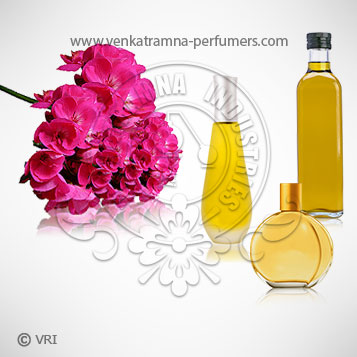
| Botanical Name | Pelargoneum Graveolens |
| Common Name | Rose geranium |
| Country of Origin | Egypt, Russia, Africa, Japan, Central America, Europe |
| Solubility | Insoluble in water, soluble in alcohol and oils |
| Specific Gravity | 0.892 @ 72°F |
| Optical Rotation | -30.0 – -7.0 @ 20°C |
| Refrective Index | 1.520 @ 72°F |
| PlantPart | Leaves |
| Bland With | It can blend with Basil, Bergamot, Citronella, Clary Sage, Fennel, Grapefruit, Jasmine, Juniper, Lavender, Lemon, Lemongrass, Nerolia and Nutmeg. |
| CAS No | 8000-46-2 |
| Flash Point | 72°C |
| Extraction Method | Steam Distilled |
Geranium oil is obtained through steam distillation process and extracted from the leaves and stalks of the plant. Organic Geranium is a hairy perennial shrub, mainly used in hedgerows and can grow up to about one meter high (3 feet), having pointed leaves that are serrated at the edges with pinkish-white flowers. The family Geraniaceae contains three genera: Geranium, Erodium, and Pelargonium. The names, derived from the three Greek words meaning crane, heron, and stork, refer to the resemblance of the seed case to the slender bills of these three birds. Pelargonium species originate in South Africa and different species are found in distinct habitats. The Pelargonium species related to the Geranium oil-producing cultivars are mainly located in the Cape area.
The Geranium plants originated from South Africa as well as Reunion, Madagascar, Egypt and Morocco and were introduced to European countries such as Italy, Spain and France in the 17th century. There are over 200 species of geranium, some scented and some not. Pelargonium plants are comprised of a myriad of hybrids and cultivars. They are bushy perennial shrubs possessing hairy, jagged leaves and clusters of small, pink striped flowers. The plant grows best in a warm temperate climate with plenty of sunshine for maximum oil development. It is sensitive to cold weather and frost averse. Glands located widely over the surface of the leaves and the green parts of the plant produce an aromatic volatile oil. Variations in the aromatic compounds of different cultivars results in diverse aromatic profiles for the different types of geranium essential oils available, that is, rose geranium, geranium or rose geranium bourbon. This is a key component of the surprise and delight inherent in plant-based aromas.
Color : Greenish olive liquid @22C with Characteristic floral odor,
Aroma : It is often confused with rose oil due to its rose-like fragrance.
It contains Geraniol (7 to 20%), Citronellol (20 to 40%), Linalool (5 to 15%), Menthone, geranyl formate, 10-epi-eudesmol (Egypt,Morocco, Algeria), Guaiadiene-6, 9 (China).
Owing to its therapeutic properties, geranium oil can be used in the treatment of the acne, bruises, burns, cuts, dermatitis, eczema, ulcers, breast engorgement, edema, tonsillitis and menopausal problems. Geranium essential oil has been used to treat health conditions for centuries. It is beneficial for a number of conditions, such as anxiety, depression, infection, and pain management. It’s thought to have antibacterial, antioxidant, and anti-inflammatory properties. Essence of Geranium Essential Oil The scented leaf of rose geraniums has a history of use in the culinary arts. They are applied as candied cake decorations or added to jams, vinegar, sugar or cakes for their delicate floral flavour. In aromatherapy practice geranium essential oil finds applications in dermatological, musculoskeletal and nervous system conditions and in supporting the female cycle.